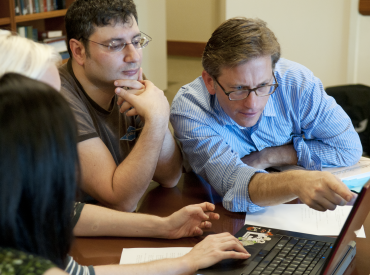Stanford is thinking broadly about how we will best educate students in the 21st century.
Through a series of events and initiatives called The Year of Learning, the campus community will generate wide-ranging discussion and debate about the future of teaching and learning at Stanford—and beyond.
The Year of Learning programs are being planned for the 2015-16 academic year and will include panel discussions featuring keynote speakers and exemplary instructors, learning symposia, student-centered special projects, field trips, full-day workshops, and more.
The Year of Learning is being organized by the office of the Vice Provost for Teaching and Learning in collaboration with the Graduate School of Education at Stanford. Program events will also be supported and hosted by partner organizations across the university.
Join the mailing list to receive updates about upcoming The Year of Learning events.
Contact Petra Dierkes-Thrun, coordinator of the Year of Learning at pdthrun@stanford.edu
Throughout the year, the Stanford community will investigate the following questions:
Autumn Quarter
Advancing the art and science of teaching and learning in higher education.
- How do we define “good teaching” and “good learning”? What does current research tell us is most effective?
- What are “good studying” habits and skills? Which extracurricular factors influence learning outcomes and what does current research tell us to pay attention to?
- How can faculty and departments recognize effective teaching and encourage it?
- How and why do teaching and learning vary between disciplines and what is common among them?
- How can we learn about best practices and diversity of goals in teaching from one another, across different schools?
- What should we do to improve teaching and learning at Stanford in the future?
Winter Quarter
The changing ecology and demography of higher education.
- Which efforts to reinvent higher education are underway on other campuses?
- What social, economic and political forces shape public expectations?
- How are our learners changing?
- What changes will learning technology, new forms of credentials, and global interconnection bring?
Spring Quarter
The future of Stanford teaching and learning in this changing environment.
- Why are learners important to the success of a leading research institution?
- Should Stanford expand its student body, range of programs, and approach to lifelong learning?
- How can Stanford pursue new opportunities in ways that respect and honor Stanford’s values, traditions, and academic integrity?





